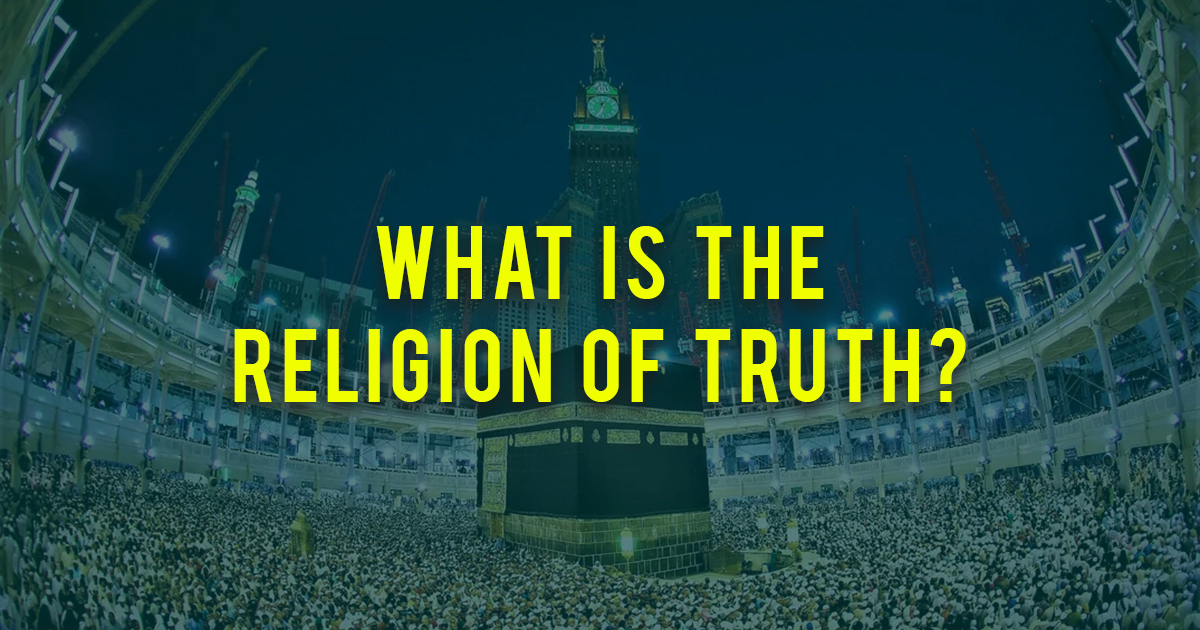We use cookies to make your experience better. To comply with the new e-Privacy directive, we need to ask for your consent to set the cookies. Learn more.
What is The Religion of Truth?

What is The Religion of Truth?
In a world where myriad belief systems coexist, the quest for the ultimate truth remains a fundamental concern of the human spirit. Among the diversity of religions, Islam is often referred to as "The Religion of Truth."
This designation isn't just a title but a profound declaration rooted in the Islamic texts and the essence of the faith itself. This blog by Darussalam delves into the understanding of Islam as the Religion of Truth, exploring its foundational principles, teachings, and the universal message it bears.
Unveiling The Concept of Truth in Islam
Islam, a monotheistic faith revealed to humanity through Prophet Muhammad (PBUH), positions itself firmly as the Religion of Truth, a notion deeply embedded in its scripture and practices.
Quranic Affirmation
Divine Declaration: The Quran refers to Islam as the truth from the Creator, designed to guide mankind (Quran 24:25).
Prophetic Mission
Universal Messenger: Prophet Muhammad’s (PBUH) life and teachings exemplify the ultimate submission (Islam) to the will of Allah (SWT), serving as a universal model for all humanity.
Learn More: What is The First Step to Converting to Islam?
Core Principles of The Religion of Truth
Islamic teachings advocate for truthfulness, not just in faith but as a virtue in all aspects of life, establishing its framework on the pillars of truth.
Oneness of God (Tawhid)
Foundation of Faith: The acknowledgment of the absolute oneness of Allah, rejecting any form of polytheism.
Prophethood (Nubuwwah)
Guidance Through Messengers: Belief in the prophets sent by Allah as bearers of truth, culminating in the finality of prophethood with Muhammad (PBUH).
Hereafter (Akhirah)
Eternal Truth: The belief in life after death, where individuals are accountable for their earthly actions.
Islamic Teachings on Seeking and Upholding Truth
Islam encourages a relentless pursuit of truth, advocating for integrity, honesty, and justice.
Intellectual Engagement
Quest for Knowledge: Islam implores believers to seek knowledge and engage in reflection as a means to discern truth.
Social Justice
Equity and Fairness: Commands fair treatment for all, justice being a pivotal tenet that aligns with the pursuit of truth.
Spiritual Honesty
Inner Sincerity: Emphasizes sincerity towards oneself and Allah, viewing the conscious submission to the divine will as the utmost truth.
The Universality of The Religion of Truth
The call of Islam transcends geographical, racial, and historical boundaries, offering a comprehensive way of life anchored in truth.
For All Humanity
Inclusive Message: Though revealed in the Arabian Peninsula, Islam's message is aimed at all mankind.
Way of Life
Comprehensive Guidance: Offers principles for governance, social justice, personal conduct, and economic practices rooted in truth.
Understanding Misconceptions
Addressing common misconceptions about Islam is crucial in highlighting its essence as the Religion of Truth.
Beyond Stereotypes
Clarifying Jihad: Often misunderstood, Jihad represents a struggle for righteousness, justice, and the defense of the faith.
Tolerance and Coexistence
Respect for Other Faiths: Islam teaches respect and protection for people of all faiths who promote peace and justice.
Read More: How to Pray in Islam
Conclusion: Embracing The Religion of Truth
Islam’s advocacy for truthfulness, justice, and the pursuit of knowledge stands as a testament to its claim as the Religion of Truth. Its universal message calls for a conscious return to the core spiritual and moral values that unify humanity.
By exploring Islam as the Religion of Truth, individuals are invited to a path of self-discovery, moral integrity, and a deeper understanding of the divine. It’s a journey that transcends mere religious observance, fostering a comprehensive worldview that cherishes truth, justice, and the betterment of humanity.
FAQs About The Religion of Truth
1. Is Islam only for Arabs or people of a certain race?
No, Islam is a universal religion intended for all of humanity, regardless of race or nationality.
2. Can truth in Islam be reconciled with modern scientific discoveries?
Yes, Islam encourages the pursuit of knowledge, and many scientific discoveries are in harmony with Islamic teachings.
3. How does Islam view followers of other religions?
Islam teaches respect and calls for peaceful coexistence with followers of other faiths, advocating for dialogue and understanding.
4. What does Islam say about freedom of belief?
Islam upholds freedom of belief, stating that there is no compulsion in religion (Quran 2:256), and emphasizes personal accountability.
5. How can one learn more about Islam?
One can learn about Islam through authentic sources such as the Quran, Hadith, and works of reputable Islamic scholars, as well as engaging in interfaith dialogues and educational platforms.

 Saudi Arabia
Saudi Arabia United Arab Emirates
United Arab Emirates Pakistan
Pakistan
















